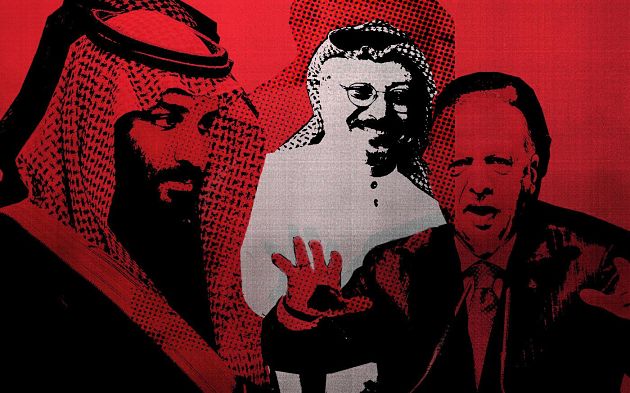Middle East Eye (MEE), an information and analysis resource specializing in Middle East politics, reported that the Saudi Arabian authorities are being guided by a secret plan aimed at overthrowing or weakening the power of Turkish President Recep Tayyip Erdogan. According to the information, the plan was developed on the orders of Saudi Crown Prince Mohammed bin Salman and his partners at the Emirates Policy Center. The reason for targeting Erdogan allegedly stems from his behavior during the scandal over the murder of Jamal Khashoggi, which he did not cover up, as the Saudi authorities had hoped, but brought maximum publicity to it, causing colossal damage to the reputation of the Saudi leadership.
It should be noted that representatives of the Emirates Policy Center did not respond to journalists’ questions about the credibility of this information, and thus did not refute it. Based on what is known about this Saudi anti-Erdogan plan, it has no analytical value. It suggests targeting Turkey in its traditional weak point – the economy. But what are the Saudis’ chances in this direction? In 2018, Saudi investments in the Turkish economy amounted to about $2 billion. As of 2019, Turkish exports to Saudi Arabia are estimated at $2.64 billion and imports at $2.32 billion.
Of course, in theory, Turkey could be deprived of these inflows or a significant portion of them. But wouldn’t that also affect Saudi companies? Would depriving a promising investment market like Turkey only affect that market, and not investors who miss out on profitable opportunities? The same goes for the possibility of cancelling bilateral contracts between Saudi and Turkish suppliers – logically, this would affect both sides, not just one.
The same goes for the ongoing game of the Saudis and Emiratis against the Turkish tourist market – in the first six months of this year, the number of Saudi tourists in Turkey fell to 234,000 from 276,000 last year. But have Saudi tourism companies not suffered, not to mention Saudi tourists themselves, for whom the alternative to budget-friendly Turkey is the more expensive Emirates and EU countries, where Arabs are not always welcome?
According to the plan, economic pressure on Turkey is intended to “weaken Erdogan’s government and force him to deal with domestic issues with the prospect of his overthrow by the opposition or constant crises that force him to make mistakes amplified by the media.”
What can be said about this? Since Turkey has been trying to pursue an active foreign policy, it is not surprising that attempts are being made to use its economic vulnerability to force it to abandon this policy and focus exclusively on domestic issues. Let us just recall the economic sanctions imposed by Russia aimed at limiting the flow of Russian tourists to Turkey, as well as imports of agricultural products and work by Turkish construction companies. They have had some effect, forcing Erdogan to apologize for shooting down a Russian plane and to cooperate with Russia in Syria. However, it is unlikely that this was achieved through sanctions alone – Russia has used a wide range of tools to pressure Turkey, from massive bombings of Aleppo to an active media campaign alleging Turkish support for ISIS and Moscow’s support for Kurdish underground communists. Do Saudi Arabia and the UAE have such a wide range of capabilities, and if not, will economic measures without them have any effect other than mutual commercial damage?
What is surprising about this story is that the pretext for pressuring Turkey was allegedly the inadequate response of its leadership to the brutal murder and dismemberment of a world-renowned journalist who had come to the country for safety. In other words, does Crown Prince Mohammed bin Salman seriously believe that he can kill and dismember his subjects on foreign soil, especially those who are internationally known, while the authorities of that country completely ignore this barbarity? Many have accused the Turkish authorities of the opposite, of failing to respond adequately to such barbarity by not suspending diplomatic relations, expelling embassy staff, and, in the end, making loud statements. However, if we believe MEE’s version, the unhinged behavior of the young ruler of Saudi Arabia went so far as to deeply offend even this, namely that the lawlessness of his killers was not covered up at the expense of Turkey’s international reputation – under such publicity.
In this situation, of course, the global Muslim community should stand by Turkey and its president. Despite legitimate claims to the contrary, we see that they, on the other hand, are attacked precisely for their attempts to help Muslims. Whether it is respect for basic decency on the Palestinian issue, timid attempts to inquire about the situation of the Uighurs in China, or disagreement with the fact of reprisals against internationally known Muslim journalists on their own territory. Despite the fact that all of this has little practical impact, we see that many in the world want Muslims not to be able to afford even that.

